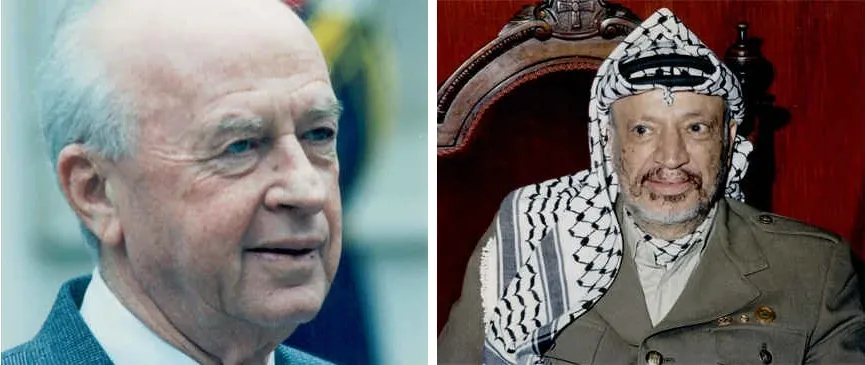Main content
Yitzhak Rabin and Yaser Arafat Prince of Asturias Award for International Cooperation 1994

The Israeli Prime Minister, Yitzhak Rabin, and the President of the Palestinian National Authority and historic leader of the Palestine Liberation Movement (PLO), Yasser Arafat, have opened up a new road ahead for peace in the Middle East. It is an alliance between old enemies who have accepted the need for peace between their respective peoples, as happened before with Menachim Begin and Muhammad Anwar el Sadat -who signed the Camp David agreements between Israel and Egypt- or like Frederick De Klerk and Nelson Mandela in South Africa (Prince of Asturias Award for International Co-operation in 1992).
As Arafat said in an interview published in Time magazine in the summer of 1994, Rabin and he are "... allies in the peace process. One of us cannot win if the other fails", which obliges them, having started the process, to go together down the same road, mutually recognising their right to live in peace and to have a homeland, forgetting old dreams of epic reconquests.
The current peace agreement was signed on the 13th September 1993 in Washington, and involves the grant of five years' self-government to the Palestinians on the Gaza Strip and in the city of Jericho, which may be subsequently extended to the whole West Bank. Beforehand, in October 1991, representatives of various Arab countries and from Israel met in Madrid, in the presence of the King of Spain, the Spanish Prime Minister and the heads of state of the United States (George Bush) and of the USSR (Mikhail Gorbachov). Multi-lateral discussions took place there which would later be continued in Washington.
However the peace process was really forged in the capital of Norway, Oslo, where direct representatives of the government of Israel and the leasdership of the PLO met in secret and produced the text of the peace agreement. Talks have recently been extended to include Jordan, while efforts continue to involve Syria in this process, which, although difficult, could substantially change the hostile situation in the Middle East.
Yitzhak Rabin (Jerusalem, Israel, 1922 – Tel Aviv, Israel, 1995), is the first Jew born in the Promised Land (Sabra) to govern Israel. Since he was nineteen years old, when he joined the Palmach commandos, he has pursued the Arabs. As chief of staff of his country, he was the strategist who won the Six Day's War (1967) during which the West Bank was conquered. In 1968 he was appointed as ambassador to Washington and in 1974, for the first time, he came to head the government, with the Labour Party to which he belongs, following the resignation of Golda Meir.
With the help of his one-time political opponent within the Labour Party, Simon Peres, he headed the Israeli efforts to reach peace.
Yaser Arafat (El Cairo, Egipto, 1929 – Clamart, Francia, 2004), always with the qualities of a leader -he had created an Association of Palestinian Students in Gaza when faced with the creation of the State of Israel in 1948- he obtained a degree in Engineering and, after a time working in Kuwait, in 1965, and after many journeys and years of struggle and negotiation, he became the head of the PLO upon its foundation. Thanks to his having maintained a balance between radicalism and moderation, he obtained international recognition from many countries and even from the United Nations. Before the UN General Assembly in 1974, he spoke these words, "I come bearing a green olive branch in one hand, and a rifle in the other. Do not allow me to drop the olive branch". After long wandering (Beirut, Tunis, ...) and even after fighting against other Palestinian organisations, the current peace process has led him to settle back in Gaza as President of the Palestinian National Authority.
End of main content
